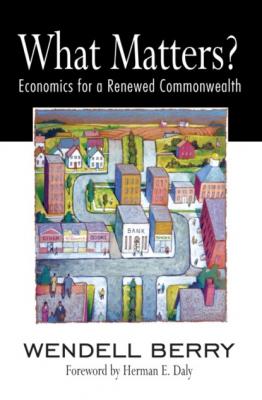ТОП просматриваемых книг сайта:
What Matters?. Wendell Berry
Читать онлайн.Название What Matters?
Год выпуска 0
isbn 9781582436708
Автор произведения Wendell Berry
Жанр Экономика
Издательство Ingram
Table of Contents
Simple Solutions, Package Deals, and a 50-Year Farm Bill
A Nation Rich in Natural Resources
We must make our choice between economy and liberty, or profusion and servitude.
THOMAS JEFFERSON
Foreword
Herman Daly
As a poet, novelist, essayist, farmer, and thinker on matters agrarian, Wendell Berry needs no introduction. But he is not a professional economist, not a guild member with a PhD union card. Nor does he claim to be such. In a world where knowledge is organized by discipline and professionalized in tight circles, it is often hard to be heard outside the circumference of one’s own silo. Therefore I fear that the very people for whom reading these essays would be most beneficial, and through whom they could have the most salutary impact on our ailing world, will simply not read them. I can imagine some of my university colleagues and students in economics departments asking: Why should I read a book by a noneconomist on “economics for a renewed commonwealth”? There likely won’t be a single equation in the book, and use of the archaic word “commonwealth” betrays a probable lack of understanding of the individualistic basis of neoclassical economic theory. Economists don’t write poetry or fiction (well, maybe a bit of the latter, but not on purpose), so let not poets or agrarian-environmentalist-localists write about the sophisticated technical science of economics in a globalized industrial growth economy. Leave it to the experts to continue to grow the economy and thereby provide the only possible solution to the problems of poverty, energy, and climate change. I can hear it now, complete with aggrieved intonation.
My purpose in this foreword is therefore to preemptively reply to this imagined but not unlikely invitation for Wendell to shut up. I want to explain why it is critically important for all citizens, especially professional economists, to read and reflect deeply on the essays in this book. Yet I understand the reluctance of someone with the commitments sketched above to give these essays a fair reading. To do so is to run a serious risk of conversion away from the dominant idolatry of our culture—a liberating conversion to be sure, but damned uncomfortable.
What do we economists have to learn from Wendell Berry? Many things, but here I will mention only two. First is a definitional correction regarding the basic nature of our subject matter—exactly what reality matters most to our economic life and why? Second, what mode of thinking does this reality require of us in order to understand it as well as possible, without seducing us into spurious substitutes for honest ignorance?
The definitional correction goes back to Aristotle and, while somewhat retained by the classical economists, seems to have been dropped from the current neoclassical canon. Aristotle distinguished “oikonomia ”from “chrematistics.” Oikonomia is the science or art of efficiently producing, distributing, and maintaining concrete use values for the household and community over the long run. Chrematistics is the art of maximizing the accumulation by individuals of abstract exchange value in the form of money in the short run. Although our word “economics” is derived from oikonomia, its present meaning is much closer to chrematistics. The word chrematistics is currently relegated to unabridged dictionaries, but the reality to which it refers is everywhere present and is frequently and incorrectly called economics. Wendell Berry is, I believe, urging us to correct our definition of economics by restoring to it the meaning of oikonomia and freeing it from confusion with, and excessive devotion to, chrematistics. In replacing chrematistics by oikonomia we not only refocus on a different reality but also embrace the purposes served within that different reality—community, frugality, efficiency, and long-term stewardship of particular places.
Where today do we find chrematistics masquerading as economics? Certainly in the recent Wall Street fiasco—selling a “bet on a debt [as] an asset” as Wendell succinctly put it. It is amazing that people who have recently engaged in this disastrous stupidity on such a massive scale still have any credibility at all! Yet belief in “free markets” as the philosopher’s stone that alchemically transmutes the dross of chrematistics into the gold of oikonomia remains strong.
Other examples of chrematistics at work include monopoly pricing, tax evasion, subsidies, rent seeking, forced mobility of labor, cheap labor from union busting and illegal immigration, off-shoring, mergers, hostile takeovers, usury, and bullying litigation—not to mention the airlines’ successful shifting on to their customers the labor previously done by former travel agents, check-in clerks, and baggage handlers. Externalizing environmental costs—shifting the cost of depletion and pollution from the producer to the general public, the future, and other species—is probably the most common and most disastrous chrematistic maneuver. The unaccounted costs range from irksome noise, to mountaintop removal and filling up of valleys with toxic tailings, to a dead zone in the Gulf of Mexico, to global climate change and species extinction. Confusing oikonomia and chrematistics, misdefining the proper subject matter of economics, has deadly consequences. In the face of all this it is hard to remember that there are still some

